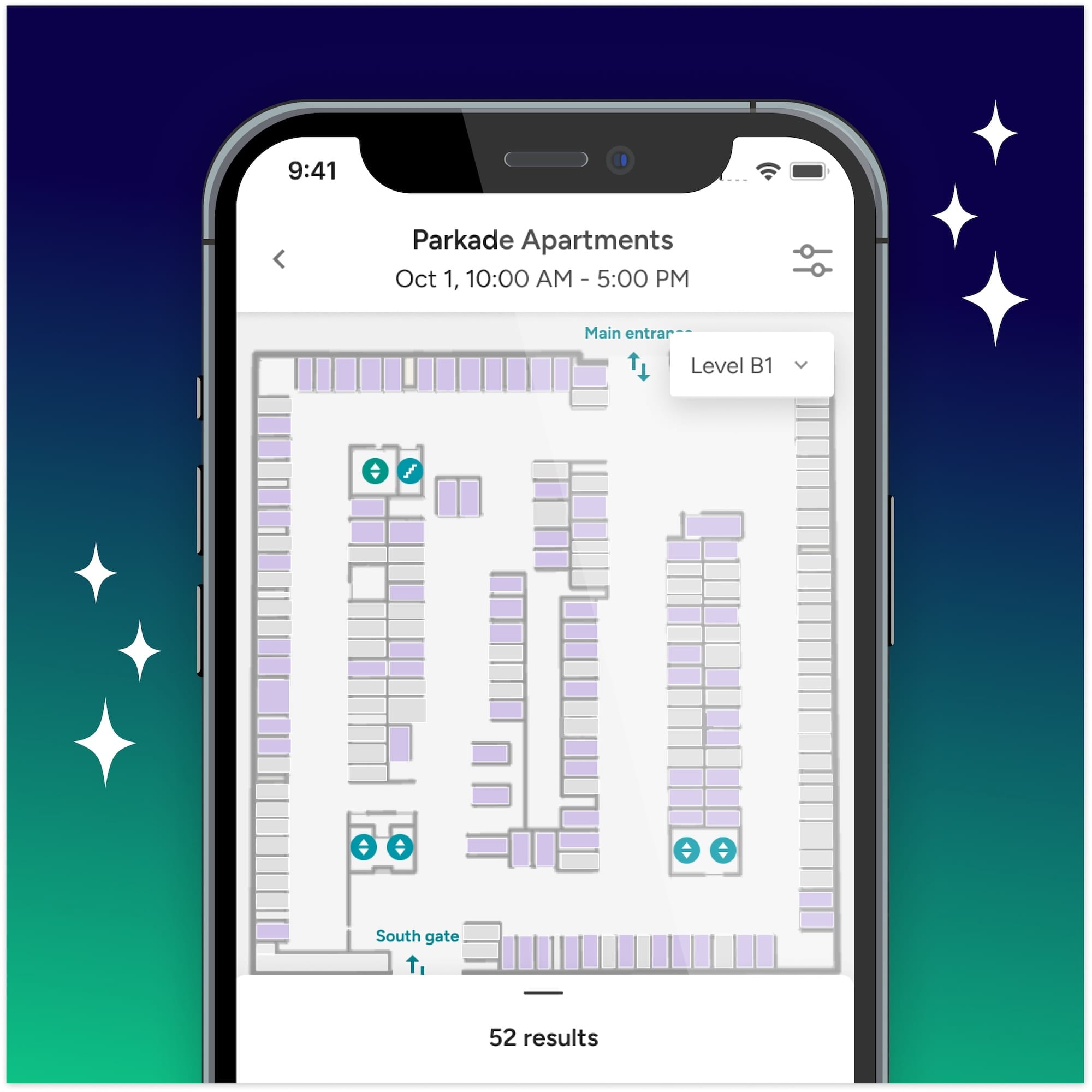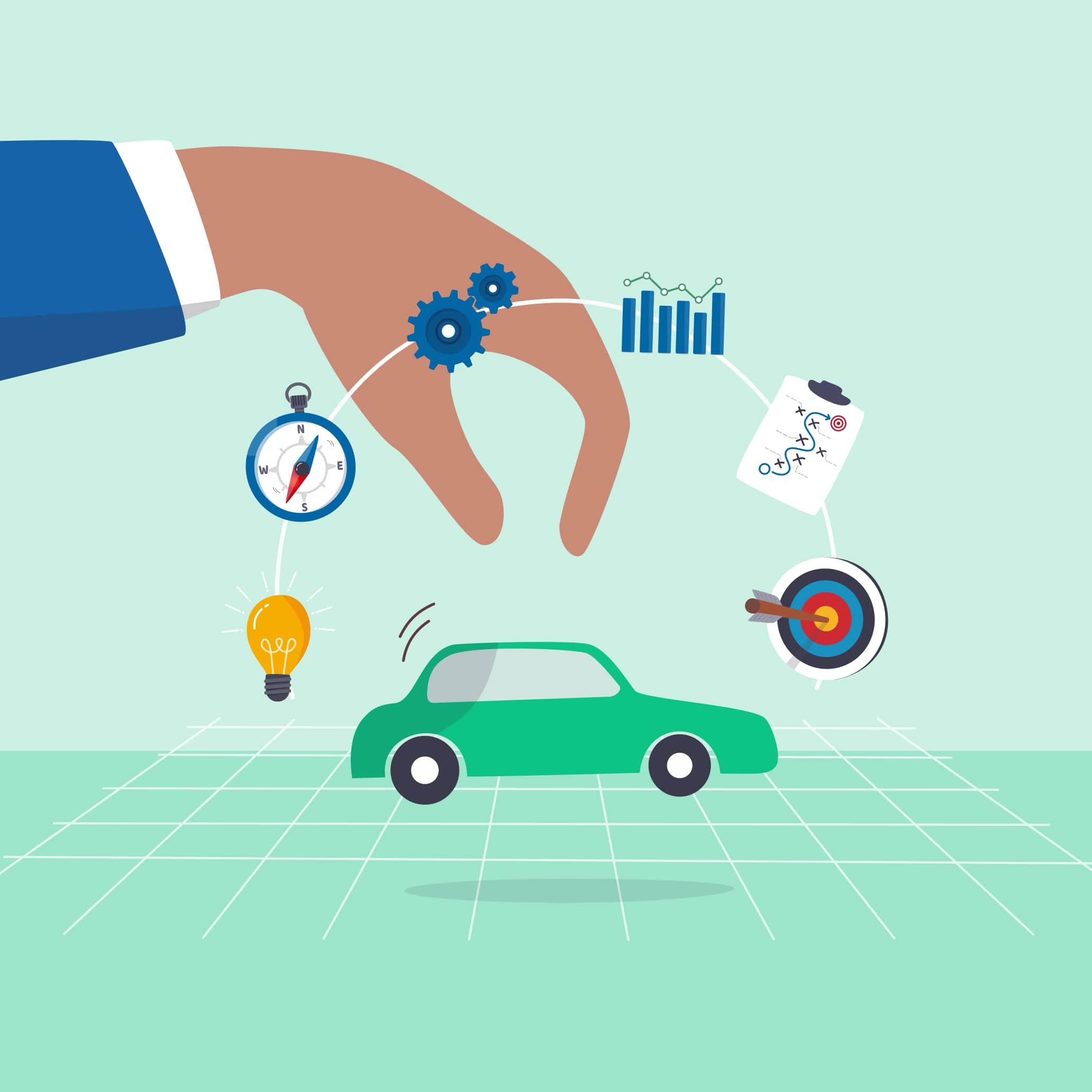

TABLE OF CONTENTS
As states succeed in flattening the COVID-19 curve (some faster than others), the conversation is beginning to shift to how to safely re-open the nation’s workplaces while keeping employees safe at work.
It’s clear that last year’s office configuration won’t work, but last year’s commute and parking at your workplace won’t work either — companies will need to flatten their parking curve to accommodate their team.
We’ve put together a guide for companies to follow on how you can not just enable a safe return to work, but make it far easier than ever for your team to have a safe, reliable commute with the help of Parkade’s tools for workplaces.
This guide explains:
The world was a different place before COVID-19 and so was your approach to commuting.
The biggest trend that’s become clear out of the mobility data we’re already seeing is that there will be two major shifts in how people commute: First, they plan to come by personal automobile in far greater numbers than before COVID-19.
That trend is already bearing out: While transit usage is down 80-90% in most communities, the rates of people driving and using micromobility (cycling, walking, scooting, etc) has already surpassed their pre-COVID-19 rates.

The CDC has gone so far as to encourage employers to offer incentives for their employees to utilize commute modes that minimize close contact.
So, for any workplace where any kind of significant chunk of employees formerly utilized public transit, you should expect many more of your employees to be driving their own cars.
Second, variability in work location (between home and the office) is poised to massively increase. Even offices where nearly everyone came to work every weekday are likely to see a significant number of employees start working from home at least a few days a month, if not each week.

Making matters more complicated, many employees have spent all of the COVID-19-imposed quarantine working from home, and reducing their commute to about 15 seconds — the time it takes to walk from their office to their desk, couch, patio or wherever they’ve been working.
While some employees may be eager to return to work, others are much less excited. And the commute is a major part of that anxiety: Most workers do not miss their commute. Not even a little.

So, like it or not, employers need to make their team’s commute easier and more enjoyable. At the same time, with such drastic commute changes happening so quickly for so many, employers must do more to ensure that everyone who needs to come back to work can get there — whatever the mode.
At many workplaces, 76% of which provide parking on-site, parking was a huge question mark before COVID-19. Some days it could be easy and employees would snag a spot by their door. Other days, they might miss out on a spot entirely and park off-site, resulting in workers from Bremerton to Pasadena doing the “parking shuffle” every 2-3 hours.
Now, with many more workers planning to drive to work, on more variable schedules, parking will be far more frustrating than ever if left unmanaged. Employers will be counted on to provide reliable parking and accommodate the increased demand.

That’s where Parkade comes in.
Gone are the days where spots are first-come, first-served or when one spot gets assigned to a single employee for months or years. With Parkade, employers can offer parking spots by the day (or even by the hour) for employees to reserve — and only for their employees, as Parkade’s parking groups are private. This allows employees to reserve parking only on the days they will need it and to keep parking open for those who plan to use it.
With Parkade’s innovative technology, you’ll be able to balance reliable parking with maximizing usage of the lot. If someone isn’t coming in, they can release their spot back into the pool, making it available for someone else to use again.
Office managers can even make some spots reservable for special cars or types of people. It’s a great way to provide reliability for those who really need it: Expectant mothers, EV drivers with range anxiety (especially if you have EV chargers) and carpool drivers. We've put together a handy video demo on how this can work:
Put your team’s mind at ease, and let them know where they’ll park before they even leave for the office. And to ease (and test) the transition, workplaces could start by making only some spots reservable, while leaving others first-come, first-served.
That’s a good way to compare the two systems, and get employee feedback on which they prefer.
By now, you might be convinced it’s time to make your parking lot reservable. But the next question is likely “OK, but what happens when we run out of parking?”
With demand for parking at your workplace likely set to skyrocket over time, we want to lay out some strategies you can employ to both decrease demand for parking and increase the supply of parking.
Let’s start with demand for parking from your employees. While it’s not life or death, the concept has some similarities with flattening the COVID-19 curve.

With COVID-19, states had a limited hospital capacity, and took drastic steps to ensure that the influx of patients didn’t overwhelm that capacity. Somewhat similarly, a workplace has a set parking capacity (say, 100 parking spots), and as employees return to work, companies will want to do their best to ensure the number of drivers is less than the total number of parking spaces (“parking capacity”).
That will be difficult, because companies need to be prepared for many more employees to opt to drive to work during and after COVID-19. Yet, it’s very likely that a good chunk of your team has options — and might be willing to commute via a different mode if you give them a slight nudge to do so.

Most of your employees will probably be happy to pay even a couple dollars a day for a reserved spot at work. Facing a small fee, however, others will choose to:
To lower parking demand, all your company needs to do is to get those with good transportation options to utilize them. The employee who lives 1.5 mi from the office may start cycling instead of driving if given encouragement.
Even better, you can use the revenue collected to further incentivize a shift in mode choice. A company with 100 parking spots that charges $100/mo to park (that’s less than $5/business day), will collect $120,000/yr in parking revenue. Since employees can pay for parking pre-tax, that will really only cost employees around $80,000 in post-tax wages.
The company could use the revenue to prop up their balance sheet or pay for perks, or use that $120,000 to incentivize employee behavior even further. For example, a company could give cash bonuses to the people who don’t drive, pay for employees’ ridesharing/vanpooling/bikesharing or (one of our favorites) give some or all of the money away in a lottery — with only people who didn’t use parking that month being eligible.
Combining a small fee for parking with a cash-based incentive system for non-parkers can convince double-digit percentages of your employees not to drive. The impact isn’t speculative either. This pay-to-park-or-get-paid system was implemented at Lyft HQ, and their head of HR at the time, Nasim Assadi, told us:
“We saw fewer people driving their own vehicles, and the ones who did reported a faster, more reliable and less stressful commute. With the program in place, we were able to double the size of the company, with the same number of parking spots.”

Like with offering reserved parking, you also don’t need to charge for all spots for this to work! Try starting with the best spots, and see if they get reserved. If and when you run out these paid spots, start moving other spots from free to paid.
As a side bonus, when your employees pay for things pre-tax, it reduces their taxable earnings, which reduces the company’s payroll tax burden. In that example of a company charging $100/mo for 100 spots that collects $120,000 in parking revenue, they’ll also save $8,400/yr in payroll taxes.
Your CFO will cheer, especially when they realize the reduced parking demand helps avoid moving to a new office just to satisfy your parking needs.
Not interested in charging for your existing parking, or, perhaps, don’t have any existing parking? We have an idea that could delight your employees: Add more parking!
COVID-19 has forced businesses in every city, on nearly every block, to close completely or operate at reduced capacity. That means there’s likely another parking lot very close to your office that will be sitting empty for a long time.
Parkade can make it possible for you to rent that lot monthly for your team, and then pass the cost on to your employees who will pay pre-tax — and again, that lowers your payroll taxes, so renting parking actually saves your company money.
If you’ve gauged parking demand and confirmed your team needs extra parking, and would pay for it, use Parkade to price the lot so that you break even.
Your employees get reliable, reservable parking and can reshare it with others when they stay home, your company actually saves money and you get to help the business down the street stay afloat. It’s a win-win-win!

Just talk to nearby businesses or parking lots, rent part or all of their lot, and add those spots to your company’s Parkade. Just set prices as desired to break even, and get the word out to your team.
We’ve prepared a few resources to help you with this transition.
Have questions about how this can work at your office? Check out workplaces resources, or drop us a note here. We’d love to talk, and help your team return to the office safely and reliably.
Some other helpful resources:
.jpg)
As parking management becomes increasingly digital, security becomes critical — and we’re excited to share that we've achieved a major security milestone.
Read Story
We’re thrilled to announce one of our most significant leaps forward this year: the launch of dynamic maps across our mobile and web applications.
Read Story
Now that AB 1317 is official, it’s time to brush up on the requirements and see how your properties stand to benefit.
Read Story